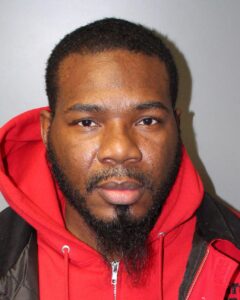The former gang member accused of commanding a violent extortion ring that allegedly took control of the New York City restoration industry is trying to exclude audio and video recordings taken off his cellphone from the evidence that federal prosecutors can use against him.
A public defender appointed to represent Jatiek Smith says in a Feb. 15 filing that US Customs and Border Patrol agents violated his client’s rights when they demanded he provide the password to his cellphone so they could download the data on it when Smith returned to the United States from a trip to Jamaica.
While government agents generally are allowed to search citizens for contraband when they cross the border, they must have reasonable suspicion of a crime to conduct a “forensic download,” attorney Thomas H. Nooter said a memorandum filed with the US District Court for Southern New York.

“Because the search and download of the forensic data from Mr. Smith’s cellphone was conducted in violation of the Fourth Amendment, the evidence seized therefrom, including the forensic download itself, should be suppressed,” the memorandum says.
A federal grand jury last June indicted Smith and eight others on racketeering and conspiracy charges. All but one of the accused are current or former members of the Bloods street gang, prosecutors say.
The U.S. Attorney’s Office for the Southern New York District says Smith and his crew used threats of violence and actual assaults to force competing fire restoration contractors and public adjusters to pay protection money and accept only the jobs assigned through a rotation system enforced by Smith’s company, First Response Cleaning Corp.
Prosecutors cited evidence taken from Smith’s cellphone when they asked US District Judge Jed S. Rakoff to deny Smith’s request to be released on $750,000 bail. They said they obtained a video of Smith’s underlings assaulting an employee of a rival restoration company.
Nooter says federal agents obtained that evidence unlawfully. According to his letter, Smith attempted to take a vacation in Jamaica in March 2021 but authorities there refused to allow him to enter the country because of prior felony convictions. Smith returned to Newark, New Jersey on the same airplane that took him to Jamaica.
When he arrived back home, federal agents told him they had a right to search the content of his electronic devices without permission and demanded the password for his cellphone. The agents made a “forensic copy” of the data stored on the cellphone. Later, the Federal Bureau of Investigation obtained a search warrant that allowed them to search the contents of that forensic copy, Nooter’s letter says.
Nooter said all of the defendants in the case are Black or brown-skinned men and many of them were once members of the Bloods. He said the seizure of evidence from Smith’s cellphone violated the Fourth Amendment prohibition against unreasonable search and seizure. The letter says violence in the New York restoration market is widespread, but no white restoration contractors have been indicted.
“The government and law enforcement have singled out for investigation and prosecution these minority defendants because they are minorities and because of their past association with a street gang not because of their alleged conduct,” the letter says.
Nooter filed a motion to suppress evidence and to dismiss the indictment against Smith and four of his co-defendants because it was based on illegally seized evidence. The US Attorneys Office had not responded to the motion as of late Tuesday.
Was this article valuable?
Here are more articles you may enjoy.

 UBS Top Executives to Appear at Senate Hearing on Credit Suisse Nazi Accounts
UBS Top Executives to Appear at Senate Hearing on Credit Suisse Nazi Accounts  US Will Test Infant Formula to See If Botulism Is Wider Risk
US Will Test Infant Formula to See If Botulism Is Wider Risk  China Bans Hidden Car Door Handles in World-First Safety Policy
China Bans Hidden Car Door Handles in World-First Safety Policy  One out of 10 Cars Sold in Europe Is Now Made by a Chinese Brand
One out of 10 Cars Sold in Europe Is Now Made by a Chinese Brand 